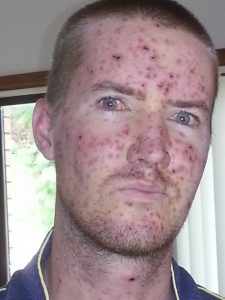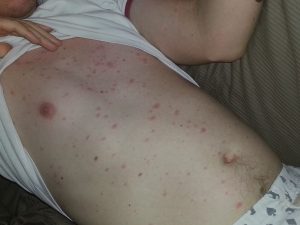Seeing Spots: Julian’s Chickenpox Story
If you made it through childhood without catching chickenpox and haven’t been vaccinated as an adult, you may want to consider the vaccine. As Julian found out, getting the chickenpox as an adult is horrific.
Julian is a schoolteacher in Australia, but the schoolyard is not where his chickenpox story began.
Julian was spending time with his two sons while on summer break. His oldest son had been vaccinated with the varicella (chickenpox) vaccine on schedule, while his youngest was still not old enough for the vaccine.
That summer, Julian’s son came down with a mild, short-lived case of chickenpox.
It had never occurred to Julian that he may be susceptible to getting the chickenpox virus, as he assumed he had caught it as a child just like everyone else. However, according to his mother, that was not the case. Julian had never caught chickenpox and was adult when the chickenpox vaccine came out, so he never got vaccinated.
Julian’s mother, who is a nurse, began to panic when she heard the news. Julian wasn’t protected and could quickly become infected.
Of course, that’s exactly what happened.
About two weeks after noticing his son was sick, Julian had a fever. In the hot Australian summer, fever is easily blamed on the heat. But when his skin became red and blotchy, he knew what was coming.
After a confirmed diagnosis of chickenpox, Julian was prescribed bed rest and isolation. Soon after, small, red dots with welts appeared all over his skin, and larger areas of the characteristic pox rash followed. The pox was not only on his skin but also internally, in his mouth, nasal passages, throat, and gastrointestinal tract.
He describes gastrointestinal pox as being the most unpleasant, as he was unable to digest food properly and suffered bouts of pus-filled diarrhea.
With too many spots to count, all he could do to relieve the itching for a short period of time was take oatmeal baths and keep his skin moisturized. Thanks to his well-trained nurse mother, his fevers, which often reached over 40*C (104*F), were carefully monitored and controlled.
His wife and mother began to worry about Julian in his final days of battling the virus, as he began to have muddled thought and speech—a symptom of encephalitis.
About eight days after the first skin symptoms appeared, the blisters scabbed over and Julian was on the mend. However, the disappearance of the spots didn’t mean his struggle was over.
The impact of the virus lasted for months. His fitness level deteriorated significantly, and it took Julian a long time to return to digesting food properly. The following year, he was weak, and he contracted all kinds of sicknesses, which dragged on for some time before he would get better. He also lost many days of work. He was left with life-lasting scars on his face and torso—a constant reminder of the virus.
He recommends that anyone who isn’t immune to chickenpox get the vaccine. He has vaccinated his two boys and will continue to follow the recommended vaccine schedule with his children. He says that in Australia, proof of vaccination wasn’t part of any contract or requirement of his employment as a schoolteacher.
Teachers work closely with children who may or may not be vaccinated against some of these deadly diseases. It is important for teachers to protect themselves. Of course, it’s good for everyone to protect themselves!
Julian has told this story to many people in hopes that they will take it seriously and get vaccinated.
Julian wants us all to know that chickenpox isn’t a disease of the past. It’s real and still there, lingering in the unvaccinated. It’s life-threatening.
“The most insulting thing that can be said is, ‘Well, you’re alive. What’s the big deal?’ Or similar points. Quite often, it is perceived that someone has to die from a disease for it to be worth complaining about. I have to contend with the scars on my body as a reminder of the worst eight days of my life thus far; the decreased quality of life is never taken into account when examining the aftermath of disease by vaccine deniers.” Julian
3 thoughts on “Seeing Spots: Julian’s Chickenpox Story”
Comments are closed.




I can relate to this story. Me and a few family members were never exposed to chicken pox as a child and the vaccine was not introduced in Australia until 2005, we all contracted the virus in 2006 as adults and we all have facial scars as a constant reminder of how nasty it can be. None of us scratched or burst the blisters either as we were old enough to know better
Unless the child develops the rare vesicular rash after getting vaccinated the vaccine doesn’t shed. The risk, of getting sick from a vaccinated person is very low. The CDC reports only five cases of transmission of varicella vaccine virus after immunization including over 55 million doses of vaccine. Julian was not vaccinated so he was susceptible to the circulating virus, and the fact that he was an adult at the time means that the risk of severity is very high.
Have you thought that perhaps it was the strain of chicken pox caused by the vaccine that made it alot more servere rather than the natural chicken pox people would normally get had it not been for the vaccine caused disease.